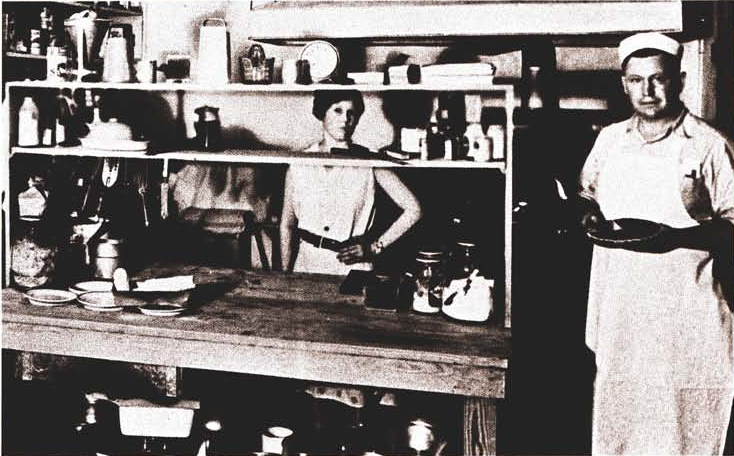
A Rough Start
In 1896, when he was six years old, Harland’s father died unexpectedly from a sudden illness. His mother was left no recourse but to go work long shifts in a local factory in order to provide for Harland and his two younger siblings. Despite his youth, Harland quickly fell into the role of caring for his brother and sister and cooking most of the family meals.
He made it through sixth grade before dropping out of school in order to work and help provide for his family. He spent the next twenty-five years in and out of work—like many of his peers in that era—trying his hand at a myriad of odd jobs, including working as a farm hand, a railroad fireman, an insurance salesman, and even an amateur obstetrician.
Good Luck, Bad Luck
In the mid-1920s Harland was searching for work yet again, hitchhiking his way around Kentucky while on the job hunt. Fortune chose to smile on him one day, when the general manager of Standard Oil Company of Kentucky stopped his Cadillac and offered Harland a lift. The two men carried on a conversation as they drove, and by the time Harland stepped out of the shiny sedan, he had been offered a job running a service station in Nicholasville, Kentucky.
Before Harland’s arrival, the service station was doing very poorly. His first day on the job, he only sold a total of three and a half gallons of gas. The station was located on a busy street corner, so Harland knew there was potential, he just had to figure out how to draw in the customers. So he started honing his customer service skills—washing windshields, filling up radiators, and brushing mud off the floorboards, all at no extra cost. It worked. Within a few weeks, he was selling an average of five to six hundred gallons a day!
For the first time in his life, Harland was experiencing what felt like true success. But then 1929 rolled around, and with it, a drought, the stock market crash, and the Great Depression. Like thousands of other Americans, Harland’s business went under. He was bankrupt.
But all was not lost. His excellent customer service skills and initial success at the service station had been noticed by Shell Oil Company, and in 1930, at the age of forty, Harland found himself operating a brand new service station in Corbin, Kentucky. As was his way, he continued to expand the services he offered to customers, and soon he was cooking meals for hungry travelers.
A New Direction
As word got out about the tasty home-cooked meals at the service station, the customers kept pouring in. Eventually Harland expanded, moving his restaurant across the street in order to accommodate more people. Over the next two decades his business thrived.
But then in 1955, when the new Interstate System began diverting traffic around Corbin and away from his restaurant, Harland sold his business, making barely enough profit on it to cover his bills and taxes. At sixty-five years old, the once successful businessman was suddenly living off a meager $105/month Social Security check. It seemed as though Harland’s good fortune had ended yet again.
But Harland was not to be defeated. He knew that he was a good cook—his past successes could attest to that. People said everything he cooked was delicious, but the dish that differentiated Harland from every other cook was his crispy, juicy, fried chicken—made from a secret recipe he crafted himself. With the conviction that his chicken was the best in the country, at the age of sixty-five Harland began developing a fried chicken franchising business.
Persistence Pays Off
He faced a lot of closed doors and disappointments at first, but he persevered. Within less than ten years, Colonel Harland Sanders had more than six hundred Kentucky Fried Chicken franchises in North America. He sold his business in 1964 for $2 million.
In her book Is This Seat Taken? It’s Never Too Late to Find the Right Seat, author Kristin Kaufman said of Harland,
“He never lost hope. He never gave up. He never lost the belief in himself and his abilities. He vowed to always do his best, in whatever endeavor he undertook. Most importantly, he never lost faith that all would work out if he created the best product he could and continue to provide excellent customer service to his clients.”
Kaufman closed her chapter about Harland Sanders with this statement:
“It is never too late in life to pursue and achieve your dreams. It all comes down to how badly you want to do so. Harland Sanders’ tenacity built a life and legacy, representing an ‘Original Recipe’ of success.”
How about you, are you persevering in the pursuit of your dreams? Don’t lose hope, and don’t lose faith. It’s never too late!

